Panteón de Dolores
| Panteón de Dolores | |
|---|---|
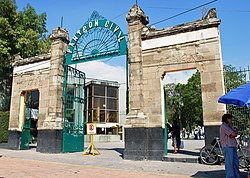 Main entrance to the Panteón de Dolores | |
 | |
| Details | |
| Established | 1875 |
| Location | |
| Country | Mexico |
| Type | Closed (1975) |
| Size | 240 square hectometres (590 acres) |
| No. of graves | 700,000 |
| No. of interments | over 1 million |
The Panteón Civil de Dolores is the largest cemetery in Mexico and contains the Rotonda de las Personas Ilustres (English: Circle of Illustrious Persons). It is located on Avenida Constituyentes in the Miguel Hidalgo borough of Mexico City, between sections two and three of Chapultepec Park.[1]
History
[edit]The history of the cemetery goes back to 1870, when Juan Manuel Benfield—owner of El Rancho de Coscoacoaco (his wife was Concepción Gayosso y Mugarrieta, sister of Eusebio Gayosso)—set aside an area of his ranch measuring 240 square hectometres (590 acres), called La Tabla de Dolores, on which he intended to establish a cemetery. In 1875, the cemetery was opened and named El Panteón Civil de Dolores. Juan Manuel Benfield founded the cemetery in honor of his sister, who died in Veracruz shortly after she had arrived from London, England with their parents. As they were Anglicans, and all cemeteries in Veracruz were consecrated for use only by Roman Catholics, the only suitable burial ground to be had was on the beach. Today, the cemetery has about 700,000 tombs, many with multiple occupants.[2]
The Rotunda of Illustrious Persons
[edit]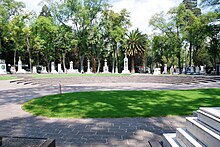
The Rotonda de las Personas Ilustres (Rotunda of Illustrious Persons) is a site that honors those who are considered to have exalted the civic, national and human values of Mexico. It contains the graves of those who have made important contributions in the military, civic and cultural fields.[3] Originally named “The Rotunda of Illustrious Men” (Rotonda de los Hombres Ilustres), it was conceived by then President Sebastián Lerdo de Tejada as a space to perpetuate the memory of chosen men. The decree reads, “In this place of honor, the necessary land will be given free of charge to erect the monuments designed to guard the remains of or perpetuate the memory of the illustrious men who are decreed or for whom posthumous honors are decreed.”
In 1876, the first person to be honored with a burial there was a soldier by the name of Pedro Litechipia, who died fighting against the empire of Maximilian.[3] By decree of President Vicente Fox, in 2003, the name was changed to “Rotonda de las Personas Ilustres” (“Rotunda of Distinguished Persons”, rather than ‘men’) as the Rotunda has a number of female occupants.[3] The Rotunda contains the graves of three former presidents, many heroes from the Mexican Revolution, writers, artists and scientists.[2] The National General Archive shows 104 images of those buried there.[3]
Problems
[edit]
Generally considered the largest cemetery in Latin America,[4] the most serious problem at the cemetery is limited space. No new grave sites have been established since 1975, and only those individuals who have purchased a site in-perpetuity, prior to 1977, can bury relatives in the cemetery; however, the remains must be stacked above those who are already interred. Municipal laws permit a maximum of five bodies to be buried in the same plot, yet some tombs may have as many as ten buried on top of each other.[2]
The cemetery is working to encourage the acceptance and practice of cremation as an acceptable alternative. The crowded cemetery, along with the desires of many to be interred there, has created a higher demand for exhumations as well as cremation services. The cemetery has four crematoria, averaging about four cremations daily. However, an average of ten traditional burials are still performed each day, all in graves that have been used previously.[2]
The cemetery is listed with National Institute of Anthropology and History as an historical monument, due to the many iconic persons interred there and the old age of the property.[5] However, this status has not kept the cemetery in good repair. There are problems with maintenance as well as security. In the back part of the cemetery, in a gully, workers have discarded old caskets and urns that are considered unusable. Those who work in the cemetery bear witness or can attest to graverobbing for artistic and archaeologically-significant pieces.[4]
In January 2009, a section of the original south-side retaining wall that was built in the 19th century crumbled and fell, damaging a number of graves in the process. This section was over 1 km long and 4 meters high.[5] Rehabilitation work had been scheduled for September 2008, at a cost of 10 million pesos, with a focus of making the cemetery more dignified for visitors, including the remodeling of the main entrance on Constituyentes Avenue.[4]
Notable people interred at the Panteón Dolores
[edit]The following is the list of people currently interred at the Rotunda of Illustrious Persons:[6]

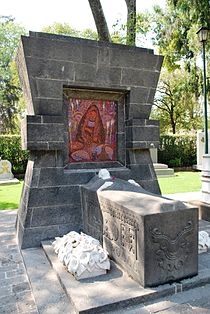
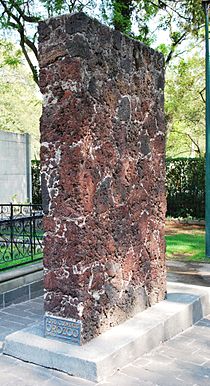
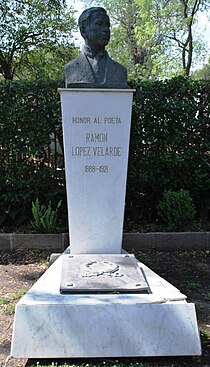
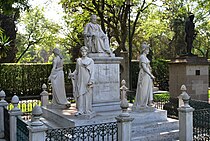
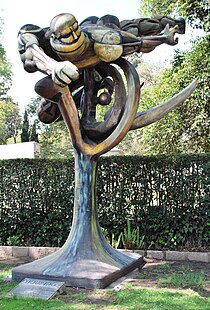
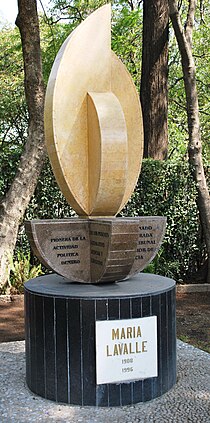
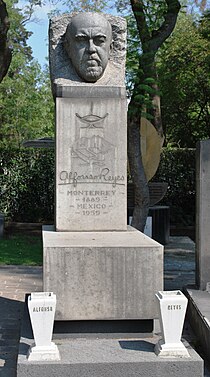
| Name | Occupation | Birthplace | Year of birth & death | Date interred |
|---|---|---|---|---|
| David Alfaro Siqueiros | muralist | Chihuahua | 1896–1974 | Jan 8, 1974 |
| Ignacio Manuel Altamirano | lawyer, novelist, diplomat | Guerrero | 1834–1893 | Nov 14, 1934 |
| Tina Modotti | photographer, activist | Friuli, Italy | 1896–1942 | |
| Juan Álvarez | interim president | Guerrero | 1790–1867 | Dec 27, 1922 |
| Eligio Ancona del Castillo | author, playwright, governor | Yucatán | 1835–1893 | Apr 13, 1903 |
| Agustín Aragón León | educator, deputy | Morelos | 1870–1954 | Mar 31, 1954 |
| Mariano Arista Nuez | president, military leader | San Luis Potosí | 1802–1855 | Oct 8, 1881 |
| Ponciano Arriaga | governor, lawyer | San Luis Potosí | 1811–1863 | Jun 22, 1900 |
| Manuel Azpiroz | military leader, diplomat | Puebla | 1836–1905 | Apr 24, 1905 |
| Mariano Azuela | author, physician | Jalisco | 1873–1952 | Mar 2, 1952 |
| Joaquín Baranda | jurist, deputy | Yucatán | 1840–1909 | Jun 29, 1981 |
| Gabino Barreda | educator | Puebla | 1818–1881 | Jan 22, 1968 |
| Felipe Berriozábal | military leader, governor | Zacatecas | 1829–1900 | Jan 12, 1900 |
| Calixto Bravo Villaso | military leader | Guerrero | 1790–1878 | Apr 7, 1878 |
| Valentín Campa | railway union leader and presidential candidate | Monterrey | 1904–1999 | Nov 25, 2019 |
| Emilio Carranza Rodríguez | aviator | Coahuila | 1905–1928 | Jul 24, 1928 |
| Nabor Carrillo Flores | scientist | Mexico City | 1911–1967 | Jan 28, 1975 |
| Julián Carrillo | musician, composer | San Luis Potosí | 1875–1965 | Jan 28, 1975 |
| Alfonso Caso | archaeologist, anthropologist | Mexico City | 1896–1970 | Jan 7, 1974 |
| Antonio Caso | author, philosopher | Mexico City | 1883–1946 | Dec 19, 1963 |
| Rosario Castellanos | author, teacher, diplomat | Mexico City | 1925–1974 | Aug 9, 1974 |
| Heberto Castillo | social leader, engineer, politician | Veracruz | 1928–1997 | Apr 5, 2004 |
| José Cevallos Cepeda | military leader, governor | Durango | 1831–1893 | Apr 22, 1893 |
| Francisco Javier Clavijero | historian, teacher | Veracruz | 1731–1787 | Aug 6, 1970 |
| Diódoro Corella | military leader | Sonora | 1838–1876 | Jun 17, 1876 |
| Carlos Chávez | musician, composer | Mexico City | 1899–1978 | Aug 3, 1978 |
| Ignacio Chávez | physician, scientist | Michoacán | 1897–1979 | Feb 26, 1997 |
| Santos Degollado | military leader, politician | Guanajuato | 1811–1861 | Nov 26, 1936 |
| Francisco Díaz Covarrubias | engineer, scientist, diplomat | Veracruz | 1833–1889 | Oct 29, 1921 |
| Salvador Díaz Mirón | poet, politician, journalist | Veracruz | 1853–1928 | Jun 16, 1928 |
| Mariano Escobedo | military leader, politician | Nuevo León | 1826–1902 | May 24, 1902 |
| Genaro Estrada | historian, politician | Sinaloa | 1887–1937 | Oct 3, 1977 |
| Virginia Fábregas | stage actress | Morelos | 1872–1950 | Nov 18, 1950 |
| Ricardo Flores Magón | journalist, anarchist | Oaxaca | 1874–1922 | May 1, 1945 |
| Juan José de la Garza | governor, jurist, military leader | Tamaulipas | 1826–1893 | Oct 18, 1893 |
| Emma Godoy | author | Guanajuato | 1918–1989 | Nov 28, 2006 |
| Valentín Gómez Farías | deputy, physician, president | Jalisco | 1781–1858 | Jul 3, 1933 |
| Manuel Gómez Morín | ideologist | Chihuahua | 1897–1972 | Feb 27, 2004 |
| Manuel González Flores | president, military leader | Tamaulipas | 1833–1893 | May 11, 1893 |
| Francisco González Bocanegra | poet, author | San Luis Potosí | 1824–1861 | Sep 27, 1932 |
| Amalia Gonzalez Caballero | diplomat, cabinet minister, minister plenipotentiary and writer | Tamaulipas | 1898–1986 | Nov 22, 2012 |
| Enrique González Martínez | author, diplomat | Jalisco | 1871–1952 | Feb 20, 1952 |
| Jesús González Ortega | military leader, governor | Zacatecas | 1822–1881 | Apr 1, 1881 |
| Donato Guerra | military leader | Jalisco | 1832–1876 | May 27, 1896 |
| Guillermo Haro | astronomer | Mexico City | 1913–1988 | Aug 6, 1994 |
| José María Iglesias | president, jurist | Mexico City | 1823–1891 | Jan 29, 1987 |
| María Izquierdo | painter | Jalisco | 1902–1955 | Nov 22, 2012 |
| Agustín Lara | musician, composer | Veracruz | 1900–1970 | Nov 9, 1970 |
| María Lavalle Urbina | magistrate, senator, rights activist | Campeche | 1908–1996 | Nov 28, 2006 |
| Sebastián Lerdo de Tejada | president, lawyer, politician | Veracruz | 1823–1889 | May 14, 1889 |
| Pedro Letechipía | military leader | Zacatecas | 1832–1876 | Mar 21, 1876 |
| Vicente Lombardo Toledano | politician, ideologist | Puebla | 1894–1968 | Jul 16, 1994 |
| Ramón López Velarde | poet | Zacatecas | 1888–1921 | Jun 15, 1963 |
| Francisco Martínez de la Vega | journalist, governor | San Luis Potosí | 1909–1985 | Aug 6, 1994 |
| José María Mata | military leader, diplomat | Veracruz | 1819–1895 | Mar 16, 1900 |
| Juan A. Mateos | author, politician | Mexico City | 1831–1813 | Dic 30, 1913 |
| Ignacio Mejía | military leader, politician | Oaxaca | 1814–1906 | Jun 27, 1914 |
| Juan N. Méndez | president, military leader | Puebla | 1820–1894 | Dec 3, 1894 |
| Jose Pablo Moncayo | pianist, percussionist, music teacher, composer and conductor | Jalisco | 1912–1958 | Nov 22, 2012 |
| Francisco Montes de Oca | military physician | Mexico City | 1837–1885 | May 18, 1885 |
| José María Luis Mora | politician, historian | Guanajuato | 1794–1850 | Jun 24, 1963 |
| Gerardo Murillo, "Dr. Atl" | muralist | Jalisco | 1875–1964 | Aug 16, 1964 |
| Miguel Negrete | military leader, minister | Puebla | 1824–1897 | May 5, 1948 |
| Amado Nervo | poet, journalist, diplomat | Nayarit | 1870–1919 | Nov 14, 1919 |
| Jaime Nunó | musician, composer | Catalonia, Spain | 1824–1908 | Oct 11, 1942 |
| Edmundo O'Gorman | writer, historian and philosopher | Mexico City | 1906–1995 | Nov 22, 2012 |
| Juan O'Gorman | muralist, architect | Mexico City | 1905–1982 | Nov 11, 1982 |
| Melchor Ocampo | politician, lawyer | Michoacán | 1814–1861 | Jun 3, 1897 |
| Isaac Ochotorena | biologist, educator | Puebla | 1885–1950 | Apr 12, 1950 |
| Pedro Ogazón Rubio | governor, politician | Jalisco | 1824–1890 | May 3, 1890 |
| José Clemente Orozco | muralist | Jalisco | 1883–1949 | Sep 8, 1949 |
| Manuel José Othón | poet, playwright, deputy | San Luis Potosí | 1858–1906 | Jun 14, 1964 |
| Carlos Pacheco | military leader, politician | Chihuahua | 1839–1891 | Sep 19, 1891 |
| Carlos Pellicer | poet, curator | Tabasco | 1899–1977 | Mar 31, 1977 |
| Manuel de la Peña y Peña | president, jurist | Mexico City | 1789–1850 | Jan 2, 1895 |
| Ángela Peralta | opera singer, composer | Mexico City | 1845–1883 | Apr 17, 1937 |
| Basilio Pérez Gallardo | politician, author | Zacatecas | 1817–1889 | Feb 6, 1889 |
| José María Pino Suárez | vice president, author, politician | Tabasco | 1869–1913 | Nov 6, 1986 |
| Manuel M. Ponce | musician, composer | Zacatecas | 1886–1948 | Oct 4, 1952 |
| Guillermo Prieto | politician, author | Mexico City | 1818–1897 | Mar 4, 1897 |
| Bernardo Quintana | engineer | Mexico City | 1919–1984 | Oct 20, 2005 |
| Ignacio Ramírez, "El Nigromante" | politician, journalist, author | Guanajuato | 1818–1879 | Oct 7, 1934 |
| Rafael Ramírez Castañeda | educator | Veracruz | 1885–1959 | Mar 23, 1976 |
| Carlos Ramírez Ulloa | engineer | Jalisco | 1903–1980 | Aug 14, 1981 |
| Miguel Ramos Arizpe | politician, priest | Coahuila | 1775–1843 | Jun 29, 1974 |
| Silvestre Revueltas | musician, composer | Durango | 1899–1940 | Mar 23, 1976 |
| Jesús Reyes Heroles | ideologist, historian, politician | Veracruz | 1921–1985 | Mar 5, 2003 |
| Alfonso Reyes | author, diplomat | Nuevo León | 1889–1959 | Dec 28, 1959 |
| Dolores del Río | actress | Durango | 1905–1983 | Nov 28, 2006 |
| Vicente Riva Palacio | author, historian, politician | Mexico City | 1832–1896 | May 20, 1936 |
| Diego Rivera | muralist, painter | Guanajuato | 1886–1957 | Nov 26, 1957 |
| Sóstenes Rocha | military leader | Guanajuato | 1831–1897 | April 1, 1897 |
| Antonio Rosales | military leader, poet, journalist | Zacatecas | 1822–1865 | Jan 5, 1923 |
| Juventino Rosas | musician, composer | Guanajuato | 1868–1894 | Jan 5, 1923 |
| Arturo Rosenblueth | physician, researcher | Chihuahua | 1900–1970 | Jan 7, 1974 |
| Carlos Rovirosa | aviator | Tabasco | 1904–1930 | May 24, 1930 |
| Miguel Ruelas | lawyer, diplomat | Zacatecas | 1838–1880 | Oct 30, 1881 |
| Moisés Sáenz | educator | Nuevo León | 1888–1941 | Jun 29, 1981 |
| Pedro Sainz de Baranda | military leader | Campeche | 1787–1845 | Mar 13, 1987 |
| Rosendo Salazar | ideologist, worker | Puebla | 1888–1971 | Dec 19, 1971 |
| Manuel Sandoval Vallarta | physicist, researcher | Mexico City | 1899–1977 | Oct 5, 1988 |
| Maj. Basilio San Martin | military leader | Toluca | 1849–1905 | Oct 9, 1905 |
| Col. Vicente San Martin | military leader | Toluca | 1839–1901 | Apr 15, 1901 |
| Francisco Sarabia | aviator | Durango | 1900–1939 | Jun 11, 1939 |
| Pablo Sidar | aviator | Zaragoza, Spain | 1895–1930 | May 24, 1930 |
| Justo Sierra | historian, politician, poet | Campeche | 1848–1912 | Nov 5, 1946 |
| Jesús Silva Herzog | economist, sociologist, teacher | San Luis Potosí | 1893–1985 | Nov 14, 1988 |
| José Juan Tablada | diplomat, author | Mexico City | 1871–1945 | Nov 5, 1946 |
| Jaime Torres Bodet | poet, diplomat | Mexico City | 1902–1974 | May 14, 1974 |
| Gregorio Torres Quintero | educator, short story author | Colima | 1866–1934 | Jun 29, 1981 |
| Luis G. Urbina | poet, journalist | Mexico City | 1864–1934 | Dec 13, 1934 |
| Francisco L. Urquizo | revolutionary general, historian | Coahuila | 1891–1969 | Aug 6, 1994 |
| Jesús Urueta | politician, journalist | Chihuahua | 1867–1920 | Mar 29, 1921 |
| Basilio Vadillo | educator, diplomat, politician | Jalisco | 1885–1935 | Nov 5, 1935 |
| Ignacio L. Vallarta | governor, jurist, politician | Jalisco | 1830–1893 | Jan 10, 1894 |
| Leandro Valle | military leader | Mexico City | 1833–1861 | Jun 18, 1987 |
| Felipe Villanueva | musician, composer | State of Mexico | 1862–1893 | Aug 27, 1945 |
| Agustín Yáñez | governor, author, politician | Jalisco | 1904–1980 | Jan 18, 1980 |
See also
[edit]- Cemeteries in Mexico
- Parks in Mexico City
- Rotonda de Hombres Ilustres — similar style monument in city of Chihuahua, México.
References
[edit]Panteón Civil de Dolores Cemetery,
Mexico City.
- ^ Noble, John (2000). Lonely Planet Mexico City. Oakland, CA: Lonely Planet Publications. ISBN 1-86450-087-5.
- ^ Jump up to: a b c d Tegel, Simeon (1 December 2002). "Crowd control. (Trade Talk).(Panteon Civil de Dolores cemetery runs out of space, Mexico City, Mexico)(Brief Article)". Latin Trade. Retrieved 2009-05-28.[dead link]
- ^ Jump up to: a b c d "Rotunda de las Personas Ilustres". Retrieved 2009-05-28.
- ^ Jump up to: a b c Robles, Johana (25 August 2008). "'Revivirá panteón Dolores". El Universal (in Spanish). Retrieved 2009-05-28.
- ^ Jump up to: a b Prieto Soldevilla, Alain de J. (9 February 2009). "En riesgo panteón catalogado por el INAH". CNN Expansion.com (in Spanish). Retrieved 2009-05-28.
- ^ All the information in the list can be found at the Official web page of the Rotonda de las Personas Ilustres (in Spanish). Archived 2009-08-27 at the Wayback Machine

